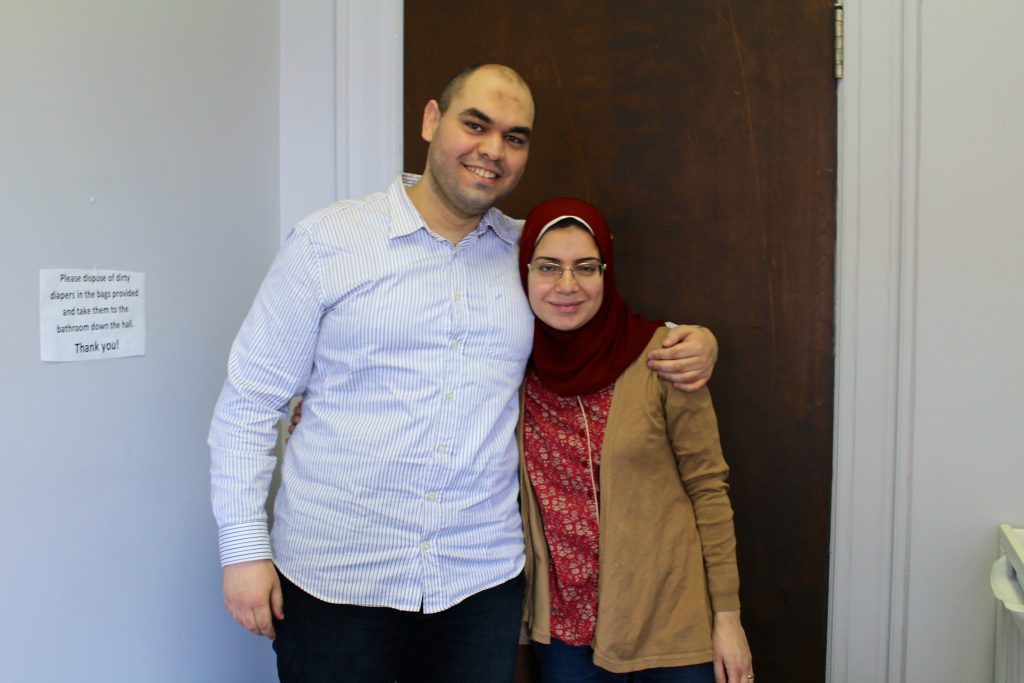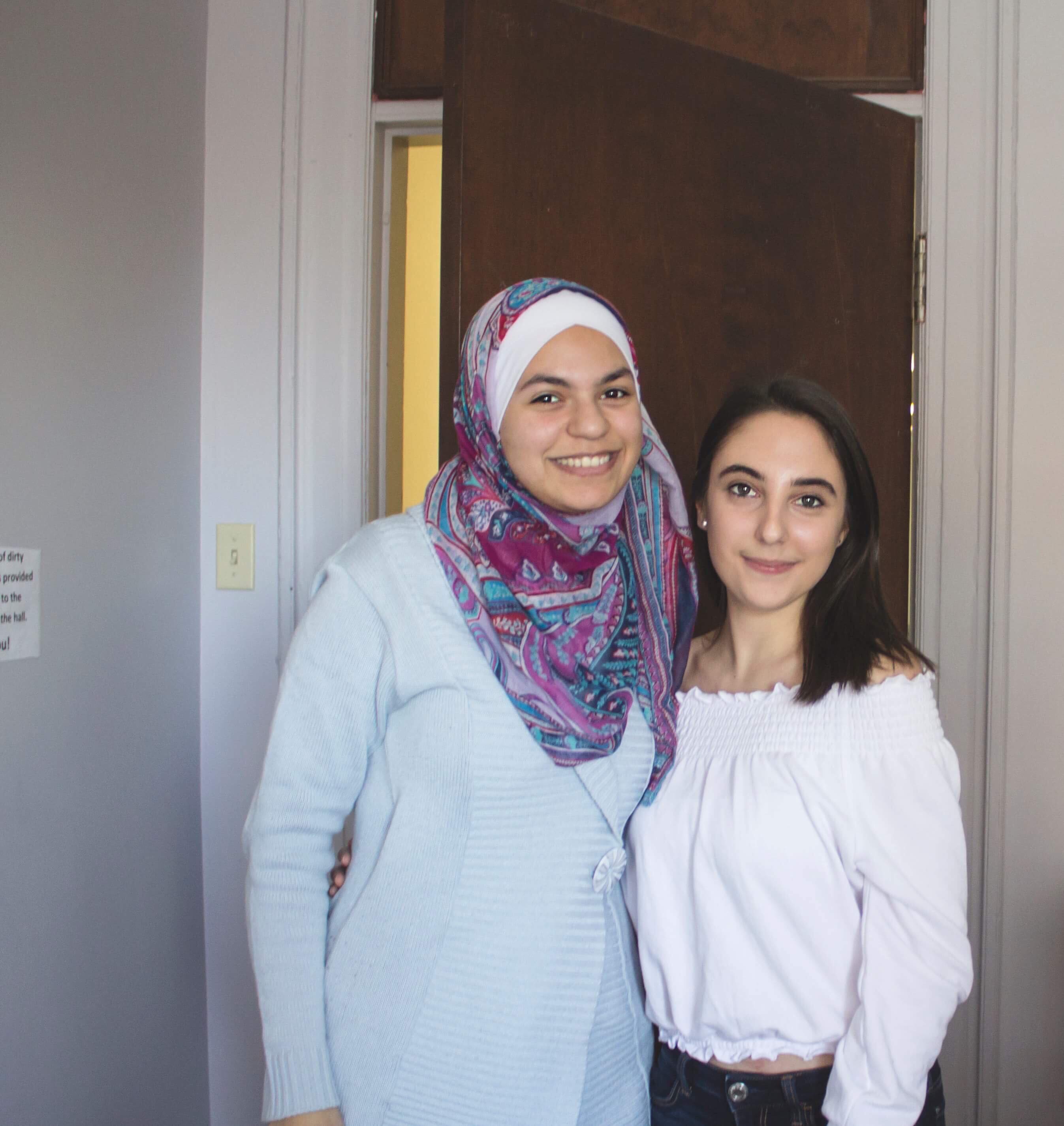Emily Dakkak (left) alongside participants from the French conversation groups with CUSP Concordia. Feature photo courtesy of Emily Dakkak.
Concordia student turns her passion into a project as she teaches French to native Arabic speakers in Montreal
Making an effort to speak someone else’s language, even if it’s only simple sentences, can help people understand more about other cultures and identities. “I feel that if you could understand the essence of a culture, you would be able to understand the language as well, and vice-versa—it’s intertwined,” said Emily Dakkak, an anthropology student at Concordia University.
For a research project in her fieldwork class, Dakkak decided to explore the language, culture and integration of native Arabic speakers in Montreal. “I always had a strong interest in languages,” said Dakkak, who speaks English, French, Spanish and a bit of Arabic. “I’ve been around Arabic my whole life. I knew I wanted to study Arabic speakers in particular.”
It was a cultural immersion trip to Cadiz, Spain, in 2016 that first sparked Dakkak’s interest in how people learn new languages and adapt to new societies. “I had Spanish lessons everyday […] and then we would have cultural activities to use the Spanish we had learned that day and communicate with native Spanish speakers,” she said. “I really loved how learning [Spanish] allowed me to integrate into the culture over there […] I was curious about how that process happened.” Dakkak also developed an interest in how language is used in different cultures.
To begin her research, Dakkak contacted the Concordia University Student Parents Centre (CUSP) concerning their French conversation group courses, where student volunteers teach other students French as a second language. Dakkak approached CUSP with her research idea, and she said the timing worked out well because the centre was looking for someone to teach the French conversation groups. Dakkak sent out a newsletter in search of native Arabic speakers interested in learning French, and received responses from a couple from Egypt, as well as a woman from Libya and one from Jordan. For two months, Dakkak taught a two-hour French class twice a week, which amounted to 32 hours of teaching. During this time, she observed how the students would interact and engage with the material when learning a new language, as part of her project’s fieldwork research.
According to Dakkak, the Egyptian couple were not staying in Montreal long, and learning French was not a priority for them. Nonetheless, she said they saw it as a useful tool. The participant from Jordan had only been in Montreal for a month, and wanted to learn some French before attending a photography conference in Quebec City. The Libyan woman who participated now lives in Montreal. A mother of five, she taught English in Libya and wanted to learn French.

Photo courtesy of Emily Dakkak.
“We had fun,” said Dakkak about her experience teaching the French conversation group. “I made [the lessons] light-hearted. I knew from the beginning that I wanted to also have an emotional connection with those people; that was really important to me.”
During the classes, Dakkak learned about different perspectives of language and culture from her students. The Egyptian man explained to Dakkak how, in Egypt, everything is heart over mind; everything has to do with your emotions, and that translates through their language. In comparison, when Dakkak was in Cadiz, the language and way of life was very relaxed. “[Their pronunciation] is more relaxed, and they don’t put as much effort with their bodies to make sounds,” she said. “They are more laid back; they spend time by the beach, and I think you can find that in the language as well.”
During her research, Dakkak came across the theory of linguistic relativity, which explains how language can be experienced differently through a specific culture. “No matter what culture you come from, you will have a certain way of speaking,” she explained. “Language is relative; it is not fixed.”
Although the significance of language within a culture is important, “I don’t think it’s everything, and this project showed me that,” Dakkak said. Occasionally, she has a hard time fitting in with her own Egyptian heritage because she only speaks a bit of Arabic. “Even if I don’t have the language, I still feel very strongly about my Arab culture but just with a different language,” Dakkak explained.
During the conversation group lessons, Dakkak would try to speak to her participants in Arabic. “They really appreciated it, and they would help me pronounce words better—I think it’s a way to bond with others,” she said.
Dakkak also observed how learning a language doesn’t necessarily integrate people into a new culture. “It’s not set in stone that, just because you are learning French, you will integrate. It can be very difficult, and it’s not the same experience for everyone,” she said.
Dakkak said she believes it’s important to let someone try to speak the language. “A lot of the native Arabic speakers told me it’s hard to go out in public and try because people don’t have the patience,” she said. “It’s a very fast-paced society; people don’t really want to let them try, so it can become a vicious circle of them not being able to practice, which hinders their development of being able to speak French.”
Dakkak wants to continue her research by digging deeper into how the emotional side of Arab culture affects the way Egyptians integrate into Montreal society.“It’s so important to understand that people are all different; they come from different backgrounds,” Dakkak said. “If someone is trying hard enough to actually learn [the language], we need to respect that.”




